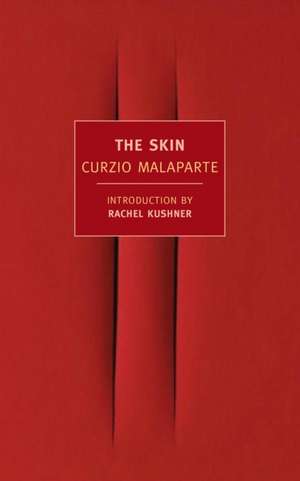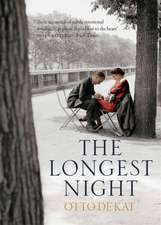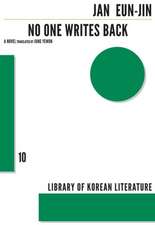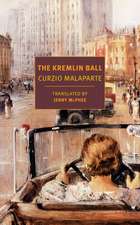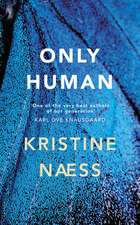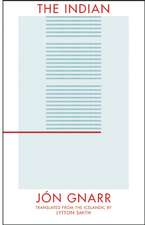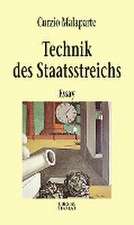The Skin: A Book for Patients and Their Doctors: New York Review Books Classics
Autor Curzio Malaparteen Limba Engleză Paperback – 20 noi 2013
Malaparte’s account begins in occupied Naples, where veterans of the disbanded and humiliated Italian army beg for work, and ceremonial dinners for high Allied officers or important politicians feature the last remaining sea creatures in the city’s famous aquarium. He leads the American Fifth Army along the Via Appia Antica into Rome, where the celebrations of a vast, joy-maddened crowd are only temporarily interrupted when one well-wisher slips beneath the tread of a Sherman tank. As the Allied advance continues north to Florence and Milan, the civil war intensifies, provoking in the author equal abhorrence for killing fellow Italians and for the “heroes of tomorrow,” those who will come out of hiding to shout “Long live liberty” as soon as the Germans are chased away.
Like Céline, another anarchic satirist and disillusioned veteran of two world wars, Malaparte paints his compatriots as in a fun-house mirror that yet speaks the truth, creating terrifying, grotesque, and often darkly comic scenes that will not soon be forgotten. Unlike the French writer however, he does so in the characteristically sophisticated, lush, yet unsentimental prose that was as responsible for his fame as was his surprising political trajectory. The Skin was condemned by the Roman Catholic Church, and placed on the Index Librorum Prohibitorum.
Din seria New York Review Books Classics
-
 Preț: 88.86 lei
Preț: 88.86 lei -
 Preț: 99.24 lei
Preț: 99.24 lei - 16%
 Preț: 79.25 lei
Preț: 79.25 lei -
 Preț: 77.73 lei
Preț: 77.73 lei -
 Preț: 124.55 lei
Preț: 124.55 lei -
 Preț: 98.73 lei
Preț: 98.73 lei -
 Preț: 83.30 lei
Preț: 83.30 lei -
 Preț: 113.45 lei
Preț: 113.45 lei -
 Preț: 102.47 lei
Preț: 102.47 lei -
 Preț: 81.20 lei
Preț: 81.20 lei -
 Preț: 174.64 lei
Preț: 174.64 lei -
 Preț: 110.73 lei
Preț: 110.73 lei -
 Preț: 119.57 lei
Preț: 119.57 lei -
 Preț: 94.01 lei
Preț: 94.01 lei -
 Preț: 85.29 lei
Preț: 85.29 lei -
 Preț: 101.24 lei
Preț: 101.24 lei -
 Preț: 182.08 lei
Preț: 182.08 lei -
 Preț: 142.67 lei
Preț: 142.67 lei -
 Preț: 90.72 lei
Preț: 90.72 lei -
 Preț: 103.29 lei
Preț: 103.29 lei -
 Preț: 113.30 lei
Preț: 113.30 lei -
 Preț: 100.59 lei
Preț: 100.59 lei -
 Preț: 126.41 lei
Preț: 126.41 lei -
 Preț: 107.40 lei
Preț: 107.40 lei -
 Preț: 174.03 lei
Preț: 174.03 lei -
 Preț: 107.44 lei
Preț: 107.44 lei -
 Preț: 89.27 lei
Preț: 89.27 lei -
 Preț: 85.34 lei
Preț: 85.34 lei -
 Preț: 90.09 lei
Preț: 90.09 lei -
 Preț: 119.36 lei
Preț: 119.36 lei -
 Preț: 99.60 lei
Preț: 99.60 lei -
 Preț: 102.25 lei
Preț: 102.25 lei -
 Preț: 127.42 lei
Preț: 127.42 lei -
 Preț: 96.27 lei
Preț: 96.27 lei -
 Preț: 85.97 lei
Preț: 85.97 lei -
 Preț: 136.91 lei
Preț: 136.91 lei -
 Preț: 161.86 lei
Preț: 161.86 lei -
 Preț: 105.17 lei
Preț: 105.17 lei -
 Preț: 88.86 lei
Preț: 88.86 lei -
 Preț: 94.83 lei
Preț: 94.83 lei -
 Preț: 118.21 lei
Preț: 118.21 lei -
 Preț: 87.20 lei
Preț: 87.20 lei -
 Preț: 95.45 lei
Preț: 95.45 lei -
 Preț: 97.50 lei
Preț: 97.50 lei -
 Preț: 111.96 lei
Preț: 111.96 lei -
 Preț: 133.18 lei
Preț: 133.18 lei -
 Preț: 100.18 lei
Preț: 100.18 lei -
 Preț: 75.23 lei
Preț: 75.23 lei -
 Preț: 91.13 lei
Preț: 91.13 lei -
 Preț: 94.86 lei
Preț: 94.86 lei
Preț: 113.98 lei
Nou
Puncte Express: 171
Preț estimativ în valută:
21.82€ • 23.71$ • 18.34£
21.82€ • 23.71$ • 18.34£
Carte disponibilă
Livrare economică 31 martie-14 aprilie
Livrare express 14-20 martie pentru 24.93 lei
Preluare comenzi: 021 569.72.76
Specificații
ISBN-13: 9781590176221
ISBN-10: 1590176227
Pagini: 368
Dimensiuni: 127 x 201 x 20 mm
Greutate: 0.36 kg
Ediția:Revised
Editura: NEW YORK REVIEW OF BOOKS
Seria New York Review Books Classics
ISBN-10: 1590176227
Pagini: 368
Dimensiuni: 127 x 201 x 20 mm
Greutate: 0.36 kg
Ediția:Revised
Editura: NEW YORK REVIEW OF BOOKS
Seria New York Review Books Classics
Notă biografică
Curzio Malaparte, the pseudonym of Kurt Erich Suckert (1898ߝ1957), was born in Prato and served in World War I. An early supporter of the Italian Fascist movement and a prolific journalist, he soon established himself as an outspoken public figure. In 1931 he incurred Mussolini’s displeasure by publishing a how-to manual entitled Technique of the Coup-d’Etat, which led to his arrest and a brief term in prison. During World War II Malaparte worked as a correspondent, for much of the time on the eastern front, and this experience provided the basis for his two most famous books, Kaputt (1944) and The Skin (1949), both available from NYRB Classics. Malaparte’s political sympathies veered to the left after the war. He continued to write, while also involving himself in the theater and the cinema. The Skin was adapted for the cinema in 1981.
Rachel Kushner was an editor at Grand Street and BOMB for many years and is now an editor at Soft Targets, a Brooklyn-based journal of art, poetry and fiction. Her first book, Telex from Cuba, was a finalist for the 2008 National Book Award and the Dayton Literary Peace Prize, winner of the California Book Award, and a New York Times bestseller and Notable Book. Her fiction and essays have appeared in The New York Times, The Believer, Artforum, Bookforum, Fence, BOMB, Cabinet, and Grand Street. Her next novel, The Flamethrowers, will be published by Scribner in April, 2013. She lives in Los Angeles.
Rachel Kushner was an editor at Grand Street and BOMB for many years and is now an editor at Soft Targets, a Brooklyn-based journal of art, poetry and fiction. Her first book, Telex from Cuba, was a finalist for the 2008 National Book Award and the Dayton Literary Peace Prize, winner of the California Book Award, and a New York Times bestseller and Notable Book. Her fiction and essays have appeared in The New York Times, The Believer, Artforum, Bookforum, Fence, BOMB, Cabinet, and Grand Street. Her next novel, The Flamethrowers, will be published by Scribner in April, 2013. She lives in Los Angeles.
Extras
CHAPTER I
The Plague
Naples was in the throes of the 'plague'. Every afternoon at five
o'clock, after half an hour with the punch-ball and a hot shower in
the gymnasium of the PBS - Peninsular Base Section - Colonel Jack
Hamilton and I would walk down in the direction of San Ferdinando,
elbowing our way through the unruly mob which thronged Via Toledo
from dawn until curfew-time.
We were clean, tidy and well fed, Jack and I, as we made our way
through the midst of the dreadful Neapolitan mob - squalid, dirty,
starving, ragged, jostled and insulted in all the languages and dialects
of the world by troops of soldiers belonging to the Armies of Liberation,
which were drawn from all the races of the earth. The distinction
of being the first among all the peoples of Europe to be liberated
had fallen to the people of Naples; and in celebration of the winning
of so well-deserved a prize my poor beloved Neapolitans, after three
years of hunger, epidemics and savage air attacks, had accepted gracefully
and patriotically the longed-for and coveted honour of playing
the part of a conquered people, of singing, clapping, jumping for joy
amid the ruins of their houses, unfurling foreign flags which until the
day before had been the emblems of their foes, and throwing flowers
from their windows on to the heads of the conquerors.
But in spite of the universal and genuine enthusiasm there was not
a single man or woman in the whole of Naples who was conscious of
having been defeated. I cannot say how this strange feeling had arisen
in the people's breasts. It was an undoubted fact that Italy, and hence
also Naples, had lost the war. It is certainly much harder to lose a
war than to win it. While everyone is good at winning a war, not all
are capable of losing one. But the loss of a war does not in itself
entitle a people to regard itself as conquered. In their ancient wisdom,
enriched by the doleful experience of many hundreds of years, and
in their sincere modesty, my poor beloved Neapolitans did not
presume to regard themselves as a conquered people. In this they
undoubtedly revealed a grave lack of tact. But could the Allies claim
to liberate peoples and at the same time compel them to regard
themselves as conquered? They must be either free or conquered. It
would be unjust to blame the people of Naples if they regarded
themselves as neither free nor conquered.
As I walked beside Colonel Hamilton I felt incredibly ridiculous in
my British uniform. The uniforms of the Italian Corps of Liberation
were old British khaki uniforms, handed over by the British Command
to Marshal Badoglio and - perhaps in an attempt to hide the bloodstains
and bullet-holes - dyed dark green, the colour of a lizard. They
were, as a matter of fact, uniforms taken from the British soldiers
who had fallen at EI Alamein and Tobruk. In my tunic three holes
made by machine-gun bullets were visible. My vest, shirt and pants
were stained with blood. Even my shoes had been taken from the
body of a British soldier. The first time I had put them on I had felt ·
something pricking the sole of my foot. 1 had thought at first that a
tiny bone belonging to the dead man had remained stuck in the shoe.
It was a nail. It would have been better, perhaps, if it really had been
a bone from the dead man: it would have been much easier for me
to remove it. It took me half an hour to find a pair of pliers and
remove the nail. There was no gainsaying it: that stupid war had
certainly ended well for us. It certainly could not have ended better.
Our amour propre as defeated soldiers was undamaged. Now we were
fighting at the side of the Allies, trying to help them win their war
after we had lost our own. Hence it was natural that we should be
wearing the uniforms of the Allied soldiers whom we had killed.
When I at last succeeded in removing the nail and putting on my
shoe I found that the company of which I was to assume command
had been assembled for some time past on the barrack-square. The
barracks consisted of an ancient monastery, which had been reduced
by time and the air bombardments to a state of ruin. It was situated
in the vicinity of La Torretta, behind Mergellina. The 'square' was a
cloistered courtyard, bounded on three sides by a portico, which rested
on slender columns of grey tufa, and on the fourth by a high yellow
wall, dotted with specks of green mould and great slabs of marble, on
which were carved long lists of names, surmounted by great black
crosses. During some cholera epidemic of centuries before the monastery
had been used as a hospital, and the names referred to those
who had died of the disease. On the wall was written in large black
letters: Requiescant in pace
.
Colonel Palese had been anxious to introduce me to my soldiers
himself, in one of those simple ceremonies of which old military men
are so fond. He was a tall, thin man, with completely white hair. He
clasped my hand in silence and smiled, sighing dolefully as he did so.
The soldiers were nearly all very young. They had fought well against
the Allies in Africa and Sicily, and for this reason the Allies had
chosen them to form the first cadre of the Italian Corps of Liberation.
Lined up before us in the .middle of the courtyard, they eyed me with
a fixed stare. They too were wearing uniforms taken from British
soldiers who had fallen at EI Alamein and Tobruk, and their shoes
were dead men's shoes. Their faces were pale and emaciated; their
eyes, which were white and steady, consisted of a moist, opaque
substance. They seemed to gaze at me without blinking.
Colonel Palese nodded his head, and the sergeant shouted:
'Company - 'shun.' The soldiers riveted their gaze upon me; it was
sorrowful and intense, like the gaze of a dead cat. Their limbs became
rigid and they sprang to attention. The hands that grasped their rifles
were white and bloodless. The flabby skin hung from the tips of their
fingers like a glove that is too big.
Colonel Palese began to speak. 'Here is your new commanding
officer,' he said, and while he spoke I looked at those Italian soldiers
with their uniforms that had been taken from British corpses, their
bloodless hands, their pale lips and white eyes. Here and there on
their chests, stomachs and legs were black spots of blood. Suddenly
I realized to my horror that these soldiers were dead. They gave out
a faint odour of musty cloth, rotten leather, and flesh that had been
dried up by the sun. I looked at Colonel Palese, and he was dead too.
The voice that proceeded from his lips was watery, cold, glutinous,
like the horrible gurgling that issues from a dead man's mouth if you
rest your hand on his stomach.
'Tell them to stand at ease,' said Colonel Palese to the sergeant
when he had ended his brief address. 'Company, stand at - ease!'
cried the sergeant. The soldiers flopped down on to their left heels
in limp and weary attitudes and stared at me fixedly, with a softer,
more distant look. 'And now,' said Colonel Palese, 'your new
commanding officer will say a few words to you.' I opened my mouth
and a horrible gurgling sound came out; my words were muffled,
thick, flaccid. I said: 'We are the volunteers of Freedom, the soldiers
of the new Italy. It is our duty to fight the Germans, to drive them
out of our homeland, to throw them back beyond our frontiers. The
eyes of all Italians are fixed upon us. It is our duty once more to hoist
the flag that has fallen in the mire, to set an example to all in the
midst of so much shame, to show ourselves worthy of the present
hour, of the task that our country entrusts to us.' When I had finished
speaking Colonel Palese said to the soldiers: 'Now one of you will
repeat what your commanding officer has said. I want to be sure you
understand. You!' he said, pointing to a soldier. 'Repeat what your
commanding officer said.'
The soldier looked at me; he was pale, he had the thin, bloodless
lips of a dead man. Slowly, in a dreadful gurgling voice, he said: 'It
is our duty to show ourselves worthy of the shame of Italy.'
Colonel Palese came up close to me. 'They understand,' he said in
a low voice, and moved silently away. Under his left armpit was a
black spot of blood which gradually spread over the material of his
uniform. I watched that black spot of blood as it gradually spread, my
eyes followed the old Italian colonel, with his uniform that had
belonged to an Englishman now dead, I watched him slowly move
away and heard the squeaking of his shoes, the shoes of a dead British
soldier, and the name of Italy stank in my nostrils like a piece of
rotten meat.
'This bastard people!' said Colonel Hamilton between his teeth
forcing his way through the crowd. '
'Why do you say that, Jack?'
Having reached the top of the Augusteo we used to turn off each
day into Via Santa Brigida, where the crowd was thinner, and pause
a moment to regain our breath.
'This bastard people,' said Jack, straightening his uniform, which
had been rumpled by the terrible pressure of the crowd.
'Don't say that, Jack.'
'Why not? This bastard, dirty people.'
'Oh, Jack! I am a bastard and a dirty Italian too. But I am proud
of being a dirty Italian. It isn't our fault if we weren't born in America.
I am sure we should be a bastard, dirty people even if we had been
born in America. Don't you think so, Jack?'
'Don't worry, Malaparte,' said Jack. 'Don't take it to heart. Life is
wonderful.'
'Yes, life is a splendid thing, Jack, I know. But don't say that.'
'Sorry,' said Jack, patting me on the shoulder. 'I didn't mean to
offend you. It's a figure of speech. I like Italians. I like this bastard,
dirty, wonderful people.'
'I know, Jack - I know you like this poor, unhappy, wonderful
people. No people on earth has ever endured as much as the people
of Naples. They have endured hunger and slavery for two thousand
years, and they don't complain. They revile no one, they hate no one
- not even their own misery. Christ was a Neapolitan.'
'Don't talk nonsense,' said Jack.
'It isn't nonsense. Christ was a Neapolitan.'
'What's the matter with you today, Malaparte?' said Jack, looking
at me with his fine eyes.
‘Nothing. What do you suppose is the matter with me?'
'You're in a black mood,' said Jack.
'Why should I be in a bad mood?'
'I know you, Malaparte. You're in a black mood today.'
'I am sad about Cassino, Jack.'
'To hell with Cassino.'
'I am sad, truly sad, about what is happening at Cassino.'
'To hell with you,' said Jack.
'It really is a shame that you're bringing such misery to Cassino.'
'Shut up, Malaparte.'
'Sorry. I didn't mean to offend you, Jack. I like Americans. I like
the pure, the clean, the wonderful American people.'
'I know, Malaparte. I know you like Americans. But take it easy,
Malaparte. Life is wonderful.'
'To hell with Cassino, Jack.'
'Oh, yes. To hell with Naples, Malaparte.'
There was a strange smell in the air. It was not the smell that
comes down at eventide from the alleys of Toledo and from the Piazza
delle Carrette and Santa Teresella degli Spagnoli. It was not the smell
from the fried-fish shops, taverns and urinals nestling in the dark and
fetid alleys of the Quarrieri that stretch from Via Toledo up towards
San Martino. It was not that nauseating, stuffy, glutinous smell,
composed of a thousand effluvia, a thousand noisome exhalations -
mille delicates puanteurs, as Jack put it - which at certain times of day
pervades the city and emanates from the withered flowers that lie in
heaps at the feet of the Madonnas in the chapels at the corners of
the alleys. It was not the smell of the sirocco, which smacks of bad
fish and of the cheese that is made from sheep's milk. It was not even
that smell of cooked meat which towards evening spreads over Naples
from the brothels - that smell in which Jean-Paul Sartre, walking one
day along Via Toledo, sombre comme une aisselle, pleine d'une ombre
chaude vaguement obscene, detected the parente immonde de I'amour et de
/a nourriture. No, it was not that smell of cooked meat which broods
over Naples towards sunset, when la chair des femmes a l'air bouillie
sous la crasse. It was an extraordinarily pure, delicate smell, dry, light,
unsubstantial - the smell of brine, the salt tang of the night air, ·the
smell of an ancient forest from the trees of which paper is made.
Parties of dishevelled, painted women, followed by crowds of negro
soldiers with pale hands, were parading up and down Via Toledo,
cleaving the air above the thronged street with shrill cries of 'Hi, Joe!
Hi, Joe!' At the entrances to the alleys loitered the public hairdressers,
the capere. They formed long lines, and each stood behind a seat. On
the seat, their eyes closed and their heads lolling against the backs or
sunk upon their breasts, sat athletic negroes with small round skulls
and yellow shoes that shone like the feet of the gilded statues of the
Angels in the church of Santa Chiara. Yelling and calling to one
another with strange guttural cries, singing, or arguing at the top of
their voices with their neighbours, who looked down from the windows
and balconies as though from boxes at the theatre, the capere sank
their combs into the negroes' curly, woolly hair, drew them towards
them with both hands, spat on the teeth to reduce the friction, poured
rivers of brilliantine into the palms of their hands, and rubbed and
smoothed the patients' wild locks like masseuses.
Bands of ragged boys knelt before their little wooden boxes, which
were plastered with flakes of mother of pearl, sea-shells and fragments
of mirrors, and beat the lids with the backs of their brushes, crying
'Shoeshine! Shoeshine!' Meanwhile, with bony, eager hands, they
grabbed the negro soldiers by the edge of the trousers as they went
past, swaying their hips. Groups of Moroccan soldiers squatted along
the walls, enveloped in their dark robes, their faces riddled with pockmarks,
their yellow, deep-set eyes shining from dark, wrinkled sockets,
inhaling through quivering nostrils the dry odour that permeated the
dusty air.
Faded women, with livid faces and painted lips, their emaciated
cheeks plastered with rouge - a dreadful and piteous sight - loitered
at the comers of the alleys, offering to the passers-by their sorry
merchandise. This consisted of boys and girls of eight or ten, whom
the soldiers - Moroccans, Indians, Algerians, Madagascans - caressed
with their fingers, slipping their hands between the buttons of their
short trousers or lifting their dresses. 'Two dollars the boys three
dollars the girls!' shouted the women. '
'Tell me frankly - would you like a little girl at three dollars?' I
said to Jack.
'Shut up, Malaparte.'
'After all, it's not much, three dollars for a little girl. Two pounds
of lamb cost far more. I'm sure a little girl costs more in London or
New York than here - isn't that so, Jack?'
'Tu me degoutes,' said Jack.
'Three dollars is barely three hundred lire. How much can a little
girl of eight or ten weigh? Fifty pounds? Remember that on the black
market two pounds of lamb cost five hundred and fifty lire, in other
words five dollars and fifty cents.'
'Shut up!' cried Jack.
During the last few days the prices of girls and boys had dropped,
and they were still falling. Whereas the prices of sugar, oil, flour, meat
and bread had risen and were still on the increase, the price of human
flesh was slumping from day to day. A girl between twenty and twenty-five
years of age, who a week before was worth up to ten dollars, was
now worth barely four dollars, bones included. This fall in the price
of human flesh on the Neapolitan market may have been due to the
fact that women were flocking to Naples from all parts of Southern
Italy. During recent weeks the wholesalers had thrown on to the
market a large consignment of Sicilian women. It was not all fresh
meat, but the speculators knew that negro soldiers have refined tastes,
and prefer meat not to be too fresh. Yet Sicilian meat was not in great
demand, and even the negroes refused it in the end: negroes don't
like white women to be too dark. Every day there arrived in Naples,
on carts drawn by wretched little donkeys or in Allied vehicles, but
mostly on foot, parties of sturdily built, robust girls, nearly all of
them peasants, attracted by the mirage of gold. They came from the
Calabrias the Apulias, the Basilicata and Molise. And so the price of
human flesh on the Neapolitan market had been crashing, and it was
feared that this might have a serious effect on the whole economy of
the city. (Nothing of the kind had ever been seen in Naples before.
It was certainly a disgrace, and the vast majority of the good people
of Naples blushed with shame because of it. But why did it not bring
a blush to the cheeks of the Allied authorities, who were the masters
of Naples?) In compensation, negroes' flesh had risen in price, and
this, luckily, was helping to re-establish a certain equilibrium on the
market.
'What does negroes' flesh cost today?' I asked Jack.
'Shut up,' he answered.
'Is it true that the flesh of a black American costs more than that
of a white American?'
'Tu m'agaces,' answered Jack.
I certainly had no intention of offending him, nor of poking fun at
him, nor even of being disrespectful to the American Army - the
loveliest, the kindest, the most respectable Army in the world. What
did it matter to me if the flesh of a black American cost more than
that of a white American? I like Americans, whatever the colour of
their skin, and I proved it a hundred times during the war. White or
black, their souls are pure, much purer than ours. I like the Americans
because they are good and sincere Christians; because they believe
that Christ is always on the side of those who are in the right; because
they believe that it is a sin to be in the wrong, that it is immoral to
be in the wrong; because they believe that they alone are honourable
men, and that all the nations of Europe are more or less dishonest;
because they believe that a conquered nation is a nation of criminals,
that defeat is a moral stigma, an expression of divine justice.
I like Americans for these reasons, and for many others that I have
not mentioned. In that terrible autumn of 1943, which brought so
much humiliation and grief to my fellow-countrymen, the Americans'
humanity and generosity, the pure and honest simplicity of their ideas
and sentiments, and the genuineness of their behaviour, instilled in
me the illusion that men hate evil, the hope that humanity would
mend its ways, and the conviction that only goodness - the goodness
and innocence of those splendid boys from across the Atlantic, who
had landed in Europe to punish the wicked and reward the good -
could redeem nations and individuals from their sins.
But of all my American friends the dearest was Staff Colonel Jack
Hamilton. Jack was a man of thirty-eight - tall, thin, pale and elegant,
with gentlemanly, almost European manners. On first acquaintance,
perhaps, he seemed more European than American, but this was not
the reason why I loved him: and I loved him like a brother. For
gradually, as I got to know him intimately, he showed himself to be
intensely and indisputably American. He had been born in South
Carolina ('My nurse,' he used to say, 'was une negresse par un demon
seeouee'), but he was not merely what is known in America as a
Southerner. Intellectually he was a man of culture and refinement,
and at the same time there was about him an almost childlike simplicity
and innocence. What I mean is that he was an American in the noblest
sense of the word - one of the most admirable men I have ever met.
He was a 'Christian gentleman'. How hard it is for me to express
what I mean by the term 'Christian gentleman" All who know and
love the Americans will understand what I mean when I say that the
American nation is a Christian nation, and that Jack was a Christian
gentleman.
Educated at Woodberry Forest School and at Virginia University,
Jack had devoted himself with equal enthusiasm to Latin, Greek and
sport, putting himself with equal confidence in the hands of Horace,
Virgil, Simonides and Xenophon and in those of the masseurs of the
University gymnasiums. In 1928 he had been a sprinter in the American
Olympic Track Team at Amsterdam, and he was prouder of his
Olympic victories than of his academic honours. After 1929 he had
spent some years in Paris as a representative of the United Press, and
he was proud of his well-nigh perfect French. 'I learned French from
the classics,' he used to say. 'My French tutors were La Fontaine and
Madame Bonnet, the caretaker of the house in which I lived in rue
Vaugirard. Tu ne trouves pas que je parle comme les animaux de La
Fontaine? It was he who taught me qu 'un chien peut bien regarder un
Eveque.'
'And you came to Europe,' I would say to him, 'to learn that? Un
chien peut bien regarder un Eveque in America as well.'
'Oh non,' Jack would reply, 'en Amerique ce sont les Eveques qui
peuvent regarder les chiens.'
Jack was also well acquainted with what he called fa banlieue de
Paris, in other words Europe. He had journeyed through Switzerland,
Belgium, Germany and Sweden in the same spirit of humanism and
with the same thirst for knowledge as the English undergraduates
who, before Dr Arnold's reform, used to journey across Europe during
their summer Grand Tour. After his travels Jack had returned to
America with the manuscripts of an essay on the spirit of European
civilization and of a thesis on Descartes, which had earned him an
appointment as Professor of Literature in a great American university.
But academic laurels do not flourish on an athlete's brow as Olympic
laurels do; and Jack could not get over the fact that a muscular strain
in the knee prevented him from running again in the international
contests for the honour of the Stars and Stripes. In an attempt to
forget his misfortune Jack would repair to the changing-room of
the University gymnasium and read his adored Virgil or his beloved
Xenophon, surrounded by that odour of rubber, soaking towels, soap
and linoleum which is peculiarly associated with classical culture in
the universities of the Anglo-Saxon countries.
One morning I came upon him unawares in the changing-room -
deserted at that hour - of the Peninsular Base Section's gymnasium,
deeply engrossed in Pindar. He looked at me and smiled, colouring
slightly. He asked me if I liked Pindar's poetry, adding that the
Pindaric odes written in honour of the athletes who had triumphed
at Olympia do not convey any idea of the long, hard drudgery of
training, that those divine verses resound with the yells of the crowd
and the triumphal applause, not with the hoarse whistling and the
rasping sound that comes from the mouths of athletes when they
make their last terrible effort. 'I know all about it,' he said, 'I know
what the last twenty yards are. Pindar is not a modem poet. He is an
English poet of the Victorian era.'
Although he preferred Horace and Virgil to all other poets because
of their serene melancholy, Greek poetry and ancient Greece filled
him with a sense of gratitude - not the gratitude of a scholar, but that
of a son. He knew by heart whole books of the Iliad, and tears would
come into his eyes when he declaimed, in Greek, the hexameters on
the 'funeral Games in honour of Patroclus'. One day, as we sat on
the bank of the Voltumo, near the Bailey bridge at Capua, waiting
for the sergeant guarding the bridge to give us the signal to cross we
discussed Winckelmann and the concept of beauty among the andient
Hellenes. I remember Jack's telling me that the gloomy, unreal,
mysterious imagery of ancient Greece, so raw and barbaric, or, as he
put it, Gothic, appealed to him less than the joyful, harmonious, clear
imagery of Hellenistic Greece, which was so young, vivacious and
modem, and which he described as a French Greece, a Greece of
the eighteenth century. And when I asked him what, in his opinion,
was the American Greece, he replied with a laugh: 'The Greece of
Xenophon'; and, still laughing, began to paint a remarkable and witty
picture of Xenophon - 'a Virginian gentleman' -which was a disguised
satire, in the style of Dr Johnson, of certain Hellenists of the Boston
school.
Jack had an indulgent and mischievous contempt for the Hellenists
of Boston. One morning I found him sitting under a tree with a book
on his knees, near a heavy battery facing Cassino. It was during the
sad days of the Battle of Cassino. It was raining - for a fortnight it
had been doing nothing but rain. Columns of lorries laden with
American soldiers, sewn up in white sheets of coarse linen cloth, were
going down in the direction of the little military cemeteries which
were to be seen here and there beside the Via Appia and the Via
Casilina. To keep the rain off the pages of his book - an eighteenth-century
anthology of Greek poetry with a soft leather binding and gilt
edges, presented to him by the worthy Gaspare Casella the famous
antiquarian bookseller of Naples and a friend of Anatole France -
Jack was sitting with his body bent forward, covering the precious
book with his mackintosh.
The Plague
Naples was in the throes of the 'plague'. Every afternoon at five
o'clock, after half an hour with the punch-ball and a hot shower in
the gymnasium of the PBS - Peninsular Base Section - Colonel Jack
Hamilton and I would walk down in the direction of San Ferdinando,
elbowing our way through the unruly mob which thronged Via Toledo
from dawn until curfew-time.
We were clean, tidy and well fed, Jack and I, as we made our way
through the midst of the dreadful Neapolitan mob - squalid, dirty,
starving, ragged, jostled and insulted in all the languages and dialects
of the world by troops of soldiers belonging to the Armies of Liberation,
which were drawn from all the races of the earth. The distinction
of being the first among all the peoples of Europe to be liberated
had fallen to the people of Naples; and in celebration of the winning
of so well-deserved a prize my poor beloved Neapolitans, after three
years of hunger, epidemics and savage air attacks, had accepted gracefully
and patriotically the longed-for and coveted honour of playing
the part of a conquered people, of singing, clapping, jumping for joy
amid the ruins of their houses, unfurling foreign flags which until the
day before had been the emblems of their foes, and throwing flowers
from their windows on to the heads of the conquerors.
But in spite of the universal and genuine enthusiasm there was not
a single man or woman in the whole of Naples who was conscious of
having been defeated. I cannot say how this strange feeling had arisen
in the people's breasts. It was an undoubted fact that Italy, and hence
also Naples, had lost the war. It is certainly much harder to lose a
war than to win it. While everyone is good at winning a war, not all
are capable of losing one. But the loss of a war does not in itself
entitle a people to regard itself as conquered. In their ancient wisdom,
enriched by the doleful experience of many hundreds of years, and
in their sincere modesty, my poor beloved Neapolitans did not
presume to regard themselves as a conquered people. In this they
undoubtedly revealed a grave lack of tact. But could the Allies claim
to liberate peoples and at the same time compel them to regard
themselves as conquered? They must be either free or conquered. It
would be unjust to blame the people of Naples if they regarded
themselves as neither free nor conquered.
As I walked beside Colonel Hamilton I felt incredibly ridiculous in
my British uniform. The uniforms of the Italian Corps of Liberation
were old British khaki uniforms, handed over by the British Command
to Marshal Badoglio and - perhaps in an attempt to hide the bloodstains
and bullet-holes - dyed dark green, the colour of a lizard. They
were, as a matter of fact, uniforms taken from the British soldiers
who had fallen at EI Alamein and Tobruk. In my tunic three holes
made by machine-gun bullets were visible. My vest, shirt and pants
were stained with blood. Even my shoes had been taken from the
body of a British soldier. The first time I had put them on I had felt ·
something pricking the sole of my foot. 1 had thought at first that a
tiny bone belonging to the dead man had remained stuck in the shoe.
It was a nail. It would have been better, perhaps, if it really had been
a bone from the dead man: it would have been much easier for me
to remove it. It took me half an hour to find a pair of pliers and
remove the nail. There was no gainsaying it: that stupid war had
certainly ended well for us. It certainly could not have ended better.
Our amour propre as defeated soldiers was undamaged. Now we were
fighting at the side of the Allies, trying to help them win their war
after we had lost our own. Hence it was natural that we should be
wearing the uniforms of the Allied soldiers whom we had killed.
When I at last succeeded in removing the nail and putting on my
shoe I found that the company of which I was to assume command
had been assembled for some time past on the barrack-square. The
barracks consisted of an ancient monastery, which had been reduced
by time and the air bombardments to a state of ruin. It was situated
in the vicinity of La Torretta, behind Mergellina. The 'square' was a
cloistered courtyard, bounded on three sides by a portico, which rested
on slender columns of grey tufa, and on the fourth by a high yellow
wall, dotted with specks of green mould and great slabs of marble, on
which were carved long lists of names, surmounted by great black
crosses. During some cholera epidemic of centuries before the monastery
had been used as a hospital, and the names referred to those
who had died of the disease. On the wall was written in large black
letters: Requiescant in pace
.
Colonel Palese had been anxious to introduce me to my soldiers
himself, in one of those simple ceremonies of which old military men
are so fond. He was a tall, thin man, with completely white hair. He
clasped my hand in silence and smiled, sighing dolefully as he did so.
The soldiers were nearly all very young. They had fought well against
the Allies in Africa and Sicily, and for this reason the Allies had
chosen them to form the first cadre of the Italian Corps of Liberation.
Lined up before us in the .middle of the courtyard, they eyed me with
a fixed stare. They too were wearing uniforms taken from British
soldiers who had fallen at EI Alamein and Tobruk, and their shoes
were dead men's shoes. Their faces were pale and emaciated; their
eyes, which were white and steady, consisted of a moist, opaque
substance. They seemed to gaze at me without blinking.
Colonel Palese nodded his head, and the sergeant shouted:
'Company - 'shun.' The soldiers riveted their gaze upon me; it was
sorrowful and intense, like the gaze of a dead cat. Their limbs became
rigid and they sprang to attention. The hands that grasped their rifles
were white and bloodless. The flabby skin hung from the tips of their
fingers like a glove that is too big.
Colonel Palese began to speak. 'Here is your new commanding
officer,' he said, and while he spoke I looked at those Italian soldiers
with their uniforms that had been taken from British corpses, their
bloodless hands, their pale lips and white eyes. Here and there on
their chests, stomachs and legs were black spots of blood. Suddenly
I realized to my horror that these soldiers were dead. They gave out
a faint odour of musty cloth, rotten leather, and flesh that had been
dried up by the sun. I looked at Colonel Palese, and he was dead too.
The voice that proceeded from his lips was watery, cold, glutinous,
like the horrible gurgling that issues from a dead man's mouth if you
rest your hand on his stomach.
'Tell them to stand at ease,' said Colonel Palese to the sergeant
when he had ended his brief address. 'Company, stand at - ease!'
cried the sergeant. The soldiers flopped down on to their left heels
in limp and weary attitudes and stared at me fixedly, with a softer,
more distant look. 'And now,' said Colonel Palese, 'your new
commanding officer will say a few words to you.' I opened my mouth
and a horrible gurgling sound came out; my words were muffled,
thick, flaccid. I said: 'We are the volunteers of Freedom, the soldiers
of the new Italy. It is our duty to fight the Germans, to drive them
out of our homeland, to throw them back beyond our frontiers. The
eyes of all Italians are fixed upon us. It is our duty once more to hoist
the flag that has fallen in the mire, to set an example to all in the
midst of so much shame, to show ourselves worthy of the present
hour, of the task that our country entrusts to us.' When I had finished
speaking Colonel Palese said to the soldiers: 'Now one of you will
repeat what your commanding officer has said. I want to be sure you
understand. You!' he said, pointing to a soldier. 'Repeat what your
commanding officer said.'
The soldier looked at me; he was pale, he had the thin, bloodless
lips of a dead man. Slowly, in a dreadful gurgling voice, he said: 'It
is our duty to show ourselves worthy of the shame of Italy.'
Colonel Palese came up close to me. 'They understand,' he said in
a low voice, and moved silently away. Under his left armpit was a
black spot of blood which gradually spread over the material of his
uniform. I watched that black spot of blood as it gradually spread, my
eyes followed the old Italian colonel, with his uniform that had
belonged to an Englishman now dead, I watched him slowly move
away and heard the squeaking of his shoes, the shoes of a dead British
soldier, and the name of Italy stank in my nostrils like a piece of
rotten meat.
'This bastard people!' said Colonel Hamilton between his teeth
forcing his way through the crowd. '
'Why do you say that, Jack?'
Having reached the top of the Augusteo we used to turn off each
day into Via Santa Brigida, where the crowd was thinner, and pause
a moment to regain our breath.
'This bastard people,' said Jack, straightening his uniform, which
had been rumpled by the terrible pressure of the crowd.
'Don't say that, Jack.'
'Why not? This bastard, dirty people.'
'Oh, Jack! I am a bastard and a dirty Italian too. But I am proud
of being a dirty Italian. It isn't our fault if we weren't born in America.
I am sure we should be a bastard, dirty people even if we had been
born in America. Don't you think so, Jack?'
'Don't worry, Malaparte,' said Jack. 'Don't take it to heart. Life is
wonderful.'
'Yes, life is a splendid thing, Jack, I know. But don't say that.'
'Sorry,' said Jack, patting me on the shoulder. 'I didn't mean to
offend you. It's a figure of speech. I like Italians. I like this bastard,
dirty, wonderful people.'
'I know, Jack - I know you like this poor, unhappy, wonderful
people. No people on earth has ever endured as much as the people
of Naples. They have endured hunger and slavery for two thousand
years, and they don't complain. They revile no one, they hate no one
- not even their own misery. Christ was a Neapolitan.'
'Don't talk nonsense,' said Jack.
'It isn't nonsense. Christ was a Neapolitan.'
'What's the matter with you today, Malaparte?' said Jack, looking
at me with his fine eyes.
‘Nothing. What do you suppose is the matter with me?'
'You're in a black mood,' said Jack.
'Why should I be in a bad mood?'
'I know you, Malaparte. You're in a black mood today.'
'I am sad about Cassino, Jack.'
'To hell with Cassino.'
'I am sad, truly sad, about what is happening at Cassino.'
'To hell with you,' said Jack.
'It really is a shame that you're bringing such misery to Cassino.'
'Shut up, Malaparte.'
'Sorry. I didn't mean to offend you, Jack. I like Americans. I like
the pure, the clean, the wonderful American people.'
'I know, Malaparte. I know you like Americans. But take it easy,
Malaparte. Life is wonderful.'
'To hell with Cassino, Jack.'
'Oh, yes. To hell with Naples, Malaparte.'
There was a strange smell in the air. It was not the smell that
comes down at eventide from the alleys of Toledo and from the Piazza
delle Carrette and Santa Teresella degli Spagnoli. It was not the smell
from the fried-fish shops, taverns and urinals nestling in the dark and
fetid alleys of the Quarrieri that stretch from Via Toledo up towards
San Martino. It was not that nauseating, stuffy, glutinous smell,
composed of a thousand effluvia, a thousand noisome exhalations -
mille delicates puanteurs, as Jack put it - which at certain times of day
pervades the city and emanates from the withered flowers that lie in
heaps at the feet of the Madonnas in the chapels at the corners of
the alleys. It was not the smell of the sirocco, which smacks of bad
fish and of the cheese that is made from sheep's milk. It was not even
that smell of cooked meat which towards evening spreads over Naples
from the brothels - that smell in which Jean-Paul Sartre, walking one
day along Via Toledo, sombre comme une aisselle, pleine d'une ombre
chaude vaguement obscene, detected the parente immonde de I'amour et de
/a nourriture. No, it was not that smell of cooked meat which broods
over Naples towards sunset, when la chair des femmes a l'air bouillie
sous la crasse. It was an extraordinarily pure, delicate smell, dry, light,
unsubstantial - the smell of brine, the salt tang of the night air, ·the
smell of an ancient forest from the trees of which paper is made.
Parties of dishevelled, painted women, followed by crowds of negro
soldiers with pale hands, were parading up and down Via Toledo,
cleaving the air above the thronged street with shrill cries of 'Hi, Joe!
Hi, Joe!' At the entrances to the alleys loitered the public hairdressers,
the capere. They formed long lines, and each stood behind a seat. On
the seat, their eyes closed and their heads lolling against the backs or
sunk upon their breasts, sat athletic negroes with small round skulls
and yellow shoes that shone like the feet of the gilded statues of the
Angels in the church of Santa Chiara. Yelling and calling to one
another with strange guttural cries, singing, or arguing at the top of
their voices with their neighbours, who looked down from the windows
and balconies as though from boxes at the theatre, the capere sank
their combs into the negroes' curly, woolly hair, drew them towards
them with both hands, spat on the teeth to reduce the friction, poured
rivers of brilliantine into the palms of their hands, and rubbed and
smoothed the patients' wild locks like masseuses.
Bands of ragged boys knelt before their little wooden boxes, which
were plastered with flakes of mother of pearl, sea-shells and fragments
of mirrors, and beat the lids with the backs of their brushes, crying
'Shoeshine! Shoeshine!' Meanwhile, with bony, eager hands, they
grabbed the negro soldiers by the edge of the trousers as they went
past, swaying their hips. Groups of Moroccan soldiers squatted along
the walls, enveloped in their dark robes, their faces riddled with pockmarks,
their yellow, deep-set eyes shining from dark, wrinkled sockets,
inhaling through quivering nostrils the dry odour that permeated the
dusty air.
Faded women, with livid faces and painted lips, their emaciated
cheeks plastered with rouge - a dreadful and piteous sight - loitered
at the comers of the alleys, offering to the passers-by their sorry
merchandise. This consisted of boys and girls of eight or ten, whom
the soldiers - Moroccans, Indians, Algerians, Madagascans - caressed
with their fingers, slipping their hands between the buttons of their
short trousers or lifting their dresses. 'Two dollars the boys three
dollars the girls!' shouted the women. '
'Tell me frankly - would you like a little girl at three dollars?' I
said to Jack.
'Shut up, Malaparte.'
'After all, it's not much, three dollars for a little girl. Two pounds
of lamb cost far more. I'm sure a little girl costs more in London or
New York than here - isn't that so, Jack?'
'Tu me degoutes,' said Jack.
'Three dollars is barely three hundred lire. How much can a little
girl of eight or ten weigh? Fifty pounds? Remember that on the black
market two pounds of lamb cost five hundred and fifty lire, in other
words five dollars and fifty cents.'
'Shut up!' cried Jack.
During the last few days the prices of girls and boys had dropped,
and they were still falling. Whereas the prices of sugar, oil, flour, meat
and bread had risen and were still on the increase, the price of human
flesh was slumping from day to day. A girl between twenty and twenty-five
years of age, who a week before was worth up to ten dollars, was
now worth barely four dollars, bones included. This fall in the price
of human flesh on the Neapolitan market may have been due to the
fact that women were flocking to Naples from all parts of Southern
Italy. During recent weeks the wholesalers had thrown on to the
market a large consignment of Sicilian women. It was not all fresh
meat, but the speculators knew that negro soldiers have refined tastes,
and prefer meat not to be too fresh. Yet Sicilian meat was not in great
demand, and even the negroes refused it in the end: negroes don't
like white women to be too dark. Every day there arrived in Naples,
on carts drawn by wretched little donkeys or in Allied vehicles, but
mostly on foot, parties of sturdily built, robust girls, nearly all of
them peasants, attracted by the mirage of gold. They came from the
Calabrias the Apulias, the Basilicata and Molise. And so the price of
human flesh on the Neapolitan market had been crashing, and it was
feared that this might have a serious effect on the whole economy of
the city. (Nothing of the kind had ever been seen in Naples before.
It was certainly a disgrace, and the vast majority of the good people
of Naples blushed with shame because of it. But why did it not bring
a blush to the cheeks of the Allied authorities, who were the masters
of Naples?) In compensation, negroes' flesh had risen in price, and
this, luckily, was helping to re-establish a certain equilibrium on the
market.
'What does negroes' flesh cost today?' I asked Jack.
'Shut up,' he answered.
'Is it true that the flesh of a black American costs more than that
of a white American?'
'Tu m'agaces,' answered Jack.
I certainly had no intention of offending him, nor of poking fun at
him, nor even of being disrespectful to the American Army - the
loveliest, the kindest, the most respectable Army in the world. What
did it matter to me if the flesh of a black American cost more than
that of a white American? I like Americans, whatever the colour of
their skin, and I proved it a hundred times during the war. White or
black, their souls are pure, much purer than ours. I like the Americans
because they are good and sincere Christians; because they believe
that Christ is always on the side of those who are in the right; because
they believe that it is a sin to be in the wrong, that it is immoral to
be in the wrong; because they believe that they alone are honourable
men, and that all the nations of Europe are more or less dishonest;
because they believe that a conquered nation is a nation of criminals,
that defeat is a moral stigma, an expression of divine justice.
I like Americans for these reasons, and for many others that I have
not mentioned. In that terrible autumn of 1943, which brought so
much humiliation and grief to my fellow-countrymen, the Americans'
humanity and generosity, the pure and honest simplicity of their ideas
and sentiments, and the genuineness of their behaviour, instilled in
me the illusion that men hate evil, the hope that humanity would
mend its ways, and the conviction that only goodness - the goodness
and innocence of those splendid boys from across the Atlantic, who
had landed in Europe to punish the wicked and reward the good -
could redeem nations and individuals from their sins.
But of all my American friends the dearest was Staff Colonel Jack
Hamilton. Jack was a man of thirty-eight - tall, thin, pale and elegant,
with gentlemanly, almost European manners. On first acquaintance,
perhaps, he seemed more European than American, but this was not
the reason why I loved him: and I loved him like a brother. For
gradually, as I got to know him intimately, he showed himself to be
intensely and indisputably American. He had been born in South
Carolina ('My nurse,' he used to say, 'was une negresse par un demon
seeouee'), but he was not merely what is known in America as a
Southerner. Intellectually he was a man of culture and refinement,
and at the same time there was about him an almost childlike simplicity
and innocence. What I mean is that he was an American in the noblest
sense of the word - one of the most admirable men I have ever met.
He was a 'Christian gentleman'. How hard it is for me to express
what I mean by the term 'Christian gentleman" All who know and
love the Americans will understand what I mean when I say that the
American nation is a Christian nation, and that Jack was a Christian
gentleman.
Educated at Woodberry Forest School and at Virginia University,
Jack had devoted himself with equal enthusiasm to Latin, Greek and
sport, putting himself with equal confidence in the hands of Horace,
Virgil, Simonides and Xenophon and in those of the masseurs of the
University gymnasiums. In 1928 he had been a sprinter in the American
Olympic Track Team at Amsterdam, and he was prouder of his
Olympic victories than of his academic honours. After 1929 he had
spent some years in Paris as a representative of the United Press, and
he was proud of his well-nigh perfect French. 'I learned French from
the classics,' he used to say. 'My French tutors were La Fontaine and
Madame Bonnet, the caretaker of the house in which I lived in rue
Vaugirard. Tu ne trouves pas que je parle comme les animaux de La
Fontaine? It was he who taught me qu 'un chien peut bien regarder un
Eveque.'
'And you came to Europe,' I would say to him, 'to learn that? Un
chien peut bien regarder un Eveque in America as well.'
'Oh non,' Jack would reply, 'en Amerique ce sont les Eveques qui
peuvent regarder les chiens.'
Jack was also well acquainted with what he called fa banlieue de
Paris, in other words Europe. He had journeyed through Switzerland,
Belgium, Germany and Sweden in the same spirit of humanism and
with the same thirst for knowledge as the English undergraduates
who, before Dr Arnold's reform, used to journey across Europe during
their summer Grand Tour. After his travels Jack had returned to
America with the manuscripts of an essay on the spirit of European
civilization and of a thesis on Descartes, which had earned him an
appointment as Professor of Literature in a great American university.
But academic laurels do not flourish on an athlete's brow as Olympic
laurels do; and Jack could not get over the fact that a muscular strain
in the knee prevented him from running again in the international
contests for the honour of the Stars and Stripes. In an attempt to
forget his misfortune Jack would repair to the changing-room of
the University gymnasium and read his adored Virgil or his beloved
Xenophon, surrounded by that odour of rubber, soaking towels, soap
and linoleum which is peculiarly associated with classical culture in
the universities of the Anglo-Saxon countries.
One morning I came upon him unawares in the changing-room -
deserted at that hour - of the Peninsular Base Section's gymnasium,
deeply engrossed in Pindar. He looked at me and smiled, colouring
slightly. He asked me if I liked Pindar's poetry, adding that the
Pindaric odes written in honour of the athletes who had triumphed
at Olympia do not convey any idea of the long, hard drudgery of
training, that those divine verses resound with the yells of the crowd
and the triumphal applause, not with the hoarse whistling and the
rasping sound that comes from the mouths of athletes when they
make their last terrible effort. 'I know all about it,' he said, 'I know
what the last twenty yards are. Pindar is not a modem poet. He is an
English poet of the Victorian era.'
Although he preferred Horace and Virgil to all other poets because
of their serene melancholy, Greek poetry and ancient Greece filled
him with a sense of gratitude - not the gratitude of a scholar, but that
of a son. He knew by heart whole books of the Iliad, and tears would
come into his eyes when he declaimed, in Greek, the hexameters on
the 'funeral Games in honour of Patroclus'. One day, as we sat on
the bank of the Voltumo, near the Bailey bridge at Capua, waiting
for the sergeant guarding the bridge to give us the signal to cross we
discussed Winckelmann and the concept of beauty among the andient
Hellenes. I remember Jack's telling me that the gloomy, unreal,
mysterious imagery of ancient Greece, so raw and barbaric, or, as he
put it, Gothic, appealed to him less than the joyful, harmonious, clear
imagery of Hellenistic Greece, which was so young, vivacious and
modem, and which he described as a French Greece, a Greece of
the eighteenth century. And when I asked him what, in his opinion,
was the American Greece, he replied with a laugh: 'The Greece of
Xenophon'; and, still laughing, began to paint a remarkable and witty
picture of Xenophon - 'a Virginian gentleman' -which was a disguised
satire, in the style of Dr Johnson, of certain Hellenists of the Boston
school.
Jack had an indulgent and mischievous contempt for the Hellenists
of Boston. One morning I found him sitting under a tree with a book
on his knees, near a heavy battery facing Cassino. It was during the
sad days of the Battle of Cassino. It was raining - for a fortnight it
had been doing nothing but rain. Columns of lorries laden with
American soldiers, sewn up in white sheets of coarse linen cloth, were
going down in the direction of the little military cemeteries which
were to be seen here and there beside the Via Appia and the Via
Casilina. To keep the rain off the pages of his book - an eighteenth-century
anthology of Greek poetry with a soft leather binding and gilt
edges, presented to him by the worthy Gaspare Casella the famous
antiquarian bookseller of Naples and a friend of Anatole France -
Jack was sitting with his body bent forward, covering the precious
book with his mackintosh.
Recenzii
“Surreal, disenchanted, on the edge of amoral, Malaparte broke literary ground for writers from Ryszard Kapuscinski to Joseph Heller.” —Frederika Randall, Wall Street Journal
“A skilled guide to the lowest depths of Europe’s inferno.” —Adrian Lyttelton, The Times Literary Supplement
“A scrupulous reporter? Probably not. One of the most remarkable writers of the 20th century? Certainly.” —Ian Buruma
“A skilled guide to the lowest depths of Europe’s inferno.” —Adrian Lyttelton, The Times Literary Supplement
“A scrupulous reporter? Probably not. One of the most remarkable writers of the 20th century? Certainly.” —Ian Buruma
